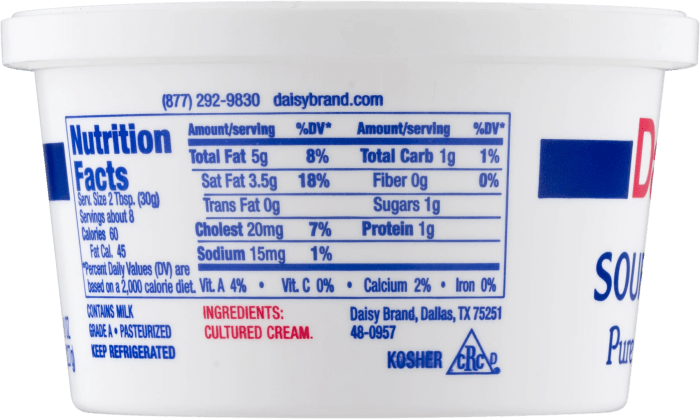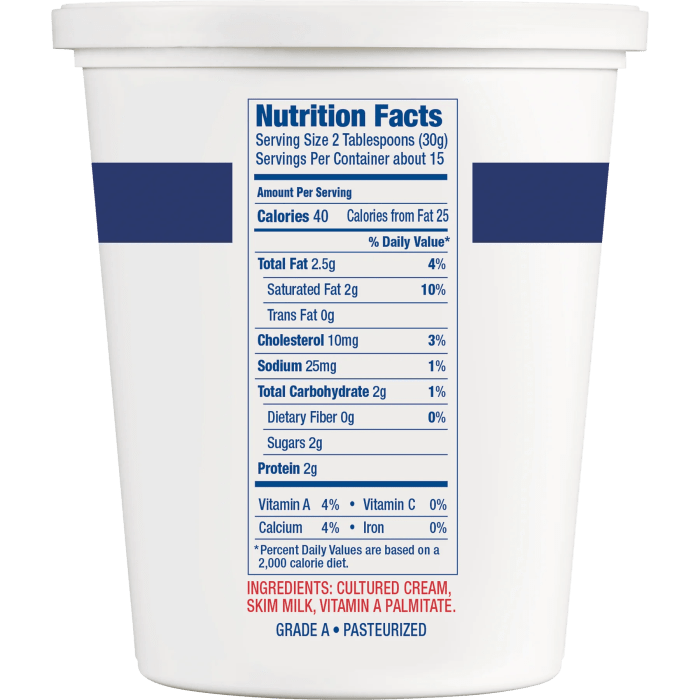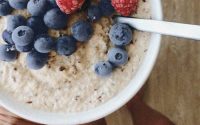Sour Cream Nutrition Facts A Comprehensive Guide
Sour Cream in Recipes and Food Preparation

Sour cream nutrition facts – Sour cream, a versatile dairy product, adds richness, tang, and creaminess to a wide array of dishes. Its nutritional profile, while containing fat, also offers protein and calcium, contributing positively to the overall nutritional value of recipes when used in moderation. Understanding how sour cream functions within recipes and the impact of cooking methods is key to maximizing its benefits.
Sour Cream’s Role in Various Recipes
Sour cream’s creamy texture and tangy flavor make it a desirable ingredient in many cuisines. Its addition often enhances the overall flavor profile and texture of the dish. The following examples illustrate its diverse applications and nutritional contributions.
- Baked Potatoes: Adding a dollop of sour cream to a baked potato provides a creamy contrast to the fluffy potato, increasing the overall satiety and adding a source of protein and calcium. The nutritional profile is boosted with the addition of healthy fats and protein from the sour cream, offsetting some of the carbohydrates from the potato.
- Chicken Enchiladas: Sour cream is frequently used as a component of the sauce or as a topping for chicken enchiladas. It contributes to the richness and creaminess of the sauce, while adding protein and calcium to the overall dish. The combination of protein from the chicken and dairy from the sour cream makes this a more balanced meal.
- Dips and Spreads: Sour cream serves as a base for numerous dips and spreads, such as spinach and artichoke dip or a simple sour cream and onion dip. These dips, while containing fat, often incorporate vegetables, adding fiber and vitamins to the overall nutritional profile. Moderation is key when consuming such dips.
Impact of Cooking Methods on Sour Cream’s Nutritional Content, Sour cream nutrition facts
The nutritional content of sour cream can be subtly affected by cooking methods. High heat can cause some loss of certain vitamins and potentially alter its texture. However, these changes are generally minimal. For example, using sour cream as a topping for a dish that is already cooked will retain most of its nutritional value. In contrast, adding sour cream to a dish that will undergo prolonged cooking at high temperatures might lead to some minor reduction in certain nutrients.
Sour Cream as a Healthy Substitute
In some recipes, sour cream can be a healthier alternative to higher-calorie ingredients, such as mayonnaise or heavy cream. For instance, using sour cream in place of mayonnaise in potato salad reduces the overall fat content, while still providing creaminess and a tangy flavor. Substituting sour cream for heavy cream in certain sauces can similarly reduce the calorie and fat content, offering a lighter option without significantly compromising taste.
It’s crucial to remember portion control even when using sour cream as a substitute, as it still contains fat.
Understanding sour cream nutrition facts is crucial for balanced eating. It’s important to consider the fat content, for instance, and compare it to other options. For those interested in a higher-protein counterpart, checking out the ribeye steak nutrition facts might be insightful, especially regarding protein and iron levels. Returning to sour cream, remember to consume it in moderation as part of a varied diet.
Sour Cream and Health Claims: Sour Cream Nutrition Facts

Sour cream, a dairy product enjoyed worldwide, is often associated with various health claims, some supported by scientific evidence and others less so. Understanding these claims and their validity is crucial for making informed dietary choices. This section will explore common health claims surrounding sour cream consumption and analyze their accuracy.
Probiotics in Sour Cream and Their Potential Health Benefits
While not all sour creams contain probiotics, some brands specifically market their products as probiotic-rich. Probiotics are live microorganisms that, when consumed in adequate amounts, confer a health benefit on the host. In sour cream, these beneficial bacteria, often strains of
- Lactobacillus* or
- Bifidobacterium*, can contribute to improved gut health. Scientific studies suggest that probiotics may aid in digestion, support immune function, and even potentially reduce the risk of certain gastrointestinal infections. However, the effectiveness of probiotics varies depending on the strain, dosage, and individual factors. It’s important to note that the probiotic content of sour cream can be affected by processing and storage conditions.
Always check the label for information on probiotic strains and their guaranteed minimum count (CFU).
Nutritional Comparison of Sour Cream Brands
Different brands of sour cream vary significantly in their nutritional profiles and ingredient lists. The following table provides a comparison of select brands, highlighting fat content, protein content, and additional ingredients. Note that nutritional information can vary slightly depending on the specific product and packaging size. Always refer to the nutrition label on the product itself for the most accurate data.
| Brand | Fat Content (per serving) | Protein Content (per serving) | Additional Ingredients |
|---|---|---|---|
| Brand A | 15g | 2g | Milk, cream, nonfat dry milk, lactic acid, salt, cultures |
| Brand B | 12g | 3g | Cultured pasteurized Grade A milk, salt |
| Brand C (Reduced Fat) | 5g | 2g | Cultured pasteurized Grade A skim milk, cream, milk solids, salt, lactic acid, xanthan gum, locust bean gum |
| Brand D (Organic) | 14g | 2.5g | Organic cultured pasteurized cream, organic cultured pasteurized milk, organic buttermilk, salt, cultures |
Note: The values provided are examples and may not reflect the exact values for all product sizes or variations. Always check the product label for the most accurate information.
Clarifying Questions
Is sour cream a good source of protein?
Yes, sour cream provides a moderate amount of protein per serving, contributing to daily protein needs.
Does sour cream contain probiotics?
Some sour cream brands may contain probiotics, but it’s not a guaranteed component. Check the label for specific information.
Can I use sour cream in baking?
Yes, sour cream can add moisture and tanginess to baked goods. However, its fat content should be considered when adjusting other ingredients.
Are there lactose-free sour cream options?
Yes, many brands offer lactose-free sour cream alternatives for individuals with lactose intolerance.
How does sour cream compare nutritionally to Greek yogurt?
Greek yogurt generally has higher protein and lower fat content than sour cream, but both provide calcium and other nutrients.


